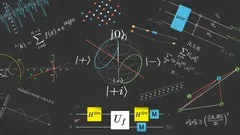
QC051: Math Prerequisites for Quantum Computing 
Whether you're brushing up on math skills or diving into quantum with no prior experience, this course equips you with the mathematical foundation necessary for quantum computing. Unlock the power of quantum algorithms, quantum gates, and more with a solid math background. Start your quantum adventure with confidence and make your mark in this groundbreaking field. ▼
ADVERTISEMENT
Course Feature
![]() Cost:
Cost:
Paid
![]() Provider:
Provider:
Udemy
![]() Certificate:
Certificate:
No Information
![]() Language:
Language:
English
![]() Start Date:
Start Date:
Self Paced
Course Overview
❗The content presented here is sourced directly from Udemy platform. For comprehensive course details, including enrollment information, simply click on the 'Go to class' link on our website.
Updated in [September 05th, 2023]
Skills and Knowledge Acquisition:
1. Linear Algebra Fundamentals: Develop a solid understanding of linear algebra, focusing on vectors, matrices, and operations.
2. Complex Numbers: Explore complex numbers, their properties, and their significance in quantum computing.
3. Dirac Notation: Learn the notation commonly used in quantum mechanics, known as Dirac notation, for representing quantum states and operators.
4. Bra-Ket Notation: Understand the bra-ket notation, a fundamental mathematical framework in quantum computing.
5. Inner Products: Explore inner products, their mathematical representation, and their application in quantum mechanics.
6. Eigenvalues and Eigenvectors: Gain proficiency in finding eigenvalues and eigenvectors of matrices, a crucial concept in quantum algorithms.
7. Matrix Operations: Learn how to perform matrix operations such as addition, multiplication, and inversion in the context of quantum computing.
8. Quantum States: Understand the mathematical representation of quantum states and their evolution over time.
9. Quantum Gates: Explore the mathematical foundations of quantum gates and their transformations on quantum states.
10. Quantum Algorithms: Get introduced to quantum algorithms and their mathematical underpinnings.
11. Probability and Statistics: Brush up on probability theory and statistics as they relate to quantum measurements and outcomes.
12. Mathematical Problem-Solving: Develop problem-solving skills by applying mathematical concepts to real-world quantum computing scenarios.
13. Quantum Computing Mathematics: Gain insights into how mathematical principles are applied in quantum computing research and development.
Contribution to Professional Growth:
- Mathematical Proficiency: Master the mathematical prerequisites essential for understanding and working with quantum computing concepts and algorithms.
- Quantum Computing Expertise: Build a strong foundation in quantum computing mathematics, positioning yourself as a competent quantum computing professional.
- Problem-Solving Skills: Develop the ability to tackle complex quantum computing challenges by applying mathematical techniques.
- Research and Development: Prepare for roles in quantum computing research and development, where mathematical expertise is highly valued.
- Career Advancement: Enhance your qualifications for roles in quantum computing, quantum software development, and quantum algorithm design.
- Further Education: Lay a robust groundwork for pursuing advanced studies, research, or certifications in quantum computing and related fields.
- Cross-Disciplinary Skills: Acquire interdisciplinary skills that bridge mathematics, quantum physics, and computer science.
- Quantum Algorithm Design: Understand the mathematical foundations of quantum algorithms, setting the stage for innovative algorithm design.
- Competitive Advantage: Stand out in the competitive job market by showcasing your mathematical prowess in quantum computing.
Suitability for Preparing Further Education:
- Advanced Quantum Studies: This course serves as a prerequisite for learners aspiring to delve deeper into advanced quantum computing coursework or research.
- Quantum Computing Specialization: Ideal for individuals planning to pursue specialized programs, certificates, or degrees in quantum computing.
- Research-Driven Learning: Provides a strong mathematical basis for those interested in contributing to quantum computing research and innovation.
- Ph.D. and Postgraduate Studies: Prepares learners for advanced academic pursuits, including Ph.D. programs in quantum computing.
- Quantum Career Trajectory: Positions students for a future in quantum computing, whether in academia, industry, or research.
- Interdisciplinary Studies: Suitable for learners aiming to bridge mathematics, quantum mechanics, and computer science in their educational journey.
Course Provider

Provider Udemy's Stats at AZClass
Discussion and Reviews
0.0 (Based on 0 reviews)
Explore Similar Online Courses

Dart - Intermediate Course

Beginner Stock Market Day Trading Course

Python for Informatics: Exploring Information

Social Network Analysis

Introduction to Systematic Review and Meta-Analysis

The Analytics Edge

DCO042 - Python For Informatics

Causal Diagrams: Draw Your Assumptions Before Your Conclusions

Whole genome sequencing of bacterial genomes - tools and applications

The Fundamentals of Quantum Computing

Fundamentals of Cloud Computing and Quantum Computing


Start your review of QC051: Math Prerequisites for Quantum Computing